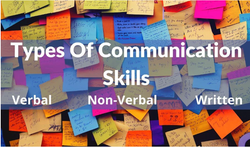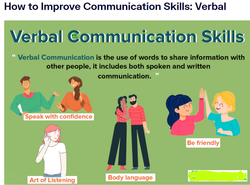Nov 16, 2022
COMMUNICATION SKILLS

Three Different Types of Communication Skills
Communication is considered one of the most important interpersonal skills, or how we interact with and relate to other people. There are three main types of communication skills: verbal, non-verbal, and written.
1. Verbal
Verbal communication is when you’re talking to other people, whether it’s face-to-face, on a video call, or over the phone. Your choice of words matters (a lot), but so do smaller details like the tone of your voice and the timing of when you say things.
2. Non-verbal
Non-verbal communication also referred to as body language, is what people see when they’re looking at you during a conversation, either face-to-face or on video. It’s your facial expressions, eye contact, and the positions of your body. You might not realize that your body language is saying, “I don’t want to be talking to you right now,” even if it’s an important conversation.
3. Written
These days, written communication mostly show up in emails and chat messages, including an email to your partner or a customer service email for work. This can also include chats on platforms like Facebook Messenger or Slack. If you’re managing a remote team, it’s important for your written communication skills to be on-point
How to Improve Communication Skills: All Three Types
1. Be an “active listener”
* Pay attention when someone else has something to say
* Ask them open-ended questions so that you can get an idea of what they want
* Ask probing questions if there are specific things you’d like to learn about
* Request clarification on anything you’re uncertain about
* Paraphrase what they said and repeat it back to them, so you can be sure you understood them correctly
* Be attuned to their feelings and your own, to make sure everyone’s needs are being met
* Summarize at the end of your interaction so everyone has the same takeaways and next steps
2. Speak up about your thoughts and ideas
Just like it’s important to understand what others are seeking, make sure that you’re expressing your own needs.
This communication skill is especially important Especially if you’re a leader, because what you say is setting the stage for your team to follow. If you’re an open and honest communicator, you’re setting an example for everyone else to do the same.
3. Try not to make assumptions
When you ask questions, listen closely to the answers, and repeat back what you think they want, you’re playing a big role in minimizing misunderstandings and lowering the risk of conflict.
4. Practice self-awareness, especially during tough conversations
It’s important to stay level-headed when you’re reacting to something you don’t like. If you feel your heart start to thump, or your face starts to get hot, take a break. Try to find some alone time where you can calm yourself down.
Another key part of self-awareness is being able to admit when you’re wrong. It might feel like a huge blow to your ego, but trust me – you’ll likely find that by admitting your mistakes and trying your best to prevent them from moving forward, you’ll build respect and integrity in the eyes of your loved ones and colleagues.
5. Don’t be accusatory when raising an issue
Tough situations are bound to happen. Even if you feel like someone did something that was completely wrong, keep your cool when you have the discussion.
If you start the conversation with an accusation that something is their fault, it’s practically an invitation for a fight. Our natural reaction to accusation is to get defensive… and nothing good comes from that conversation

1. Be brief and clear
Have you ever sat through a coworker’s long and winding story when you have a lot of work to finish? It’s rough. Try to get to the main points quickly so that you’re not that person.
2. Don’t be afraid of silence every now and then
It can seem like silence is unbearable, but it’s not always a bad thing. Don’t start blabbering just for the sake of eliminating silence. (It’s hard, but fight the urge.) Your partner and colleagues will thank you when you have a grasp of when it’s okay to be quiet.
3. Find a “bridge” if you need to change the subject
Changing the subject tactfully is an art. Try looking for a “bridge” that can connect where the conversation is now and where you want it to be. Use connecting phrases like, “The important thing is…” or “I agree with you, but…” or “Here’s what I do know…”
4. Get rid of those “um’s” and “uh’s”
This feels like common sense, but the average person uses fillers way more than they think they do. Try recording yourself in a presentation and listen back for how often you say them. Then moving forward, stay mindful of the fillers and speak more slowly so that you have time to think ahead.
5. Plan and practice what you’ll say
Of course, there are a lot of impromptu conversations where you don’t have the opportunity to plan and practice. But when you have the chance, take even 30 seconds to go over your key points. This can work wonders for your communication skills.
By undefined
13 notes ・ 21 views
English
Beginner